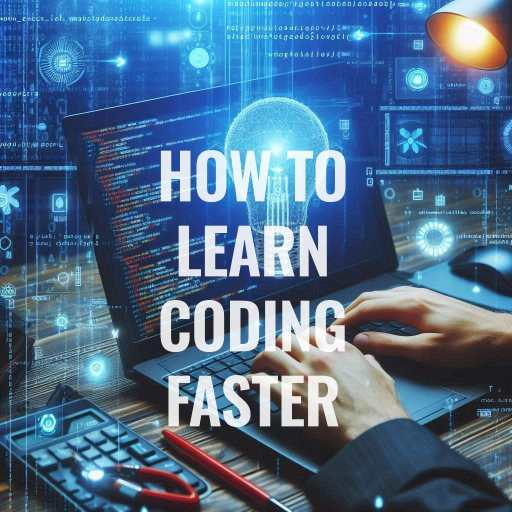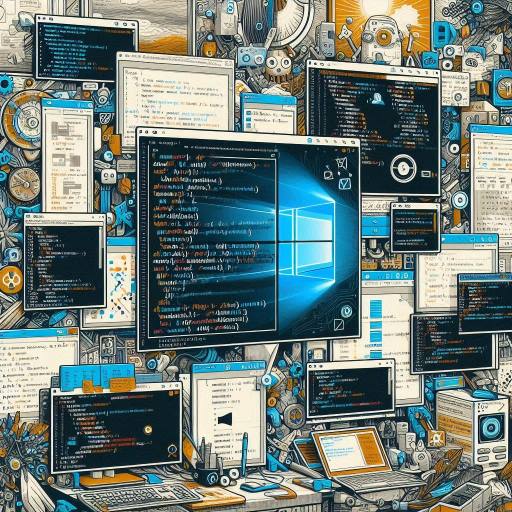How learn coding faster this question is very famous in college students worldwide the reason is that many of the students pursuing the any undergraduate program. So, they got any of the programming language. just like Python, C, C++ or the combination of WebDAV Html, CSS, JavaScript. In most of the case Python and C takes more priority as a subject in collages or university and institutes. And we all know the learning the programming language is very fun able and interesting adventure. Because In which we use to explore some keywords, projects and algorithms of programming. But….. the question is.
Table of Contents
HOW TO MAKE INTREST IN PROGRAMMING OR CODING

Making the interest towards programming or coding is very easy first of all you will have to explore some projects which is on the internet. Just like the drone, RC cars, Robots and some beautiful responsive website. And you can explore the earning 😋 from the programming or coding. Because earning and all these projects reduce your boredom towards programming and will make you creative and enthusiastic. Also try some dummy code on your code editor this will help you boost your confidence.
Steps Revision – – – – – – ->
- explore some projects which is on the internet.
- you can explore the earning from the programming or coding.
- try some dummy code on your code editor
Above video can help you to understand the hardware description language as well as ML
Programming Ideas for Beginner’s —->
1. Hello World
- Description: The classic first program. Print “Hello, World!” to the console.
- Skills Learned: Basic syntax, understanding your development environment.
- Languages: Any (Python, JavaScript, C++, etc.).
2. Simple Calculator
- Description: Create a program that can perform basic arithmetic operations like addition, subtraction, multiplication, and division.
- Skills Learned: User input handling, basic arithmetic operations, conditional statements.
- Languages: Python, Java, JavaScript.
3. Temperature Converter
- Description: Convert temperatures between Celsius and Fahrenheit.
- Skills Learned: User input, conditional logic, basic math operations.
- Languages: Python, C#, Ruby.
4. Guess the Number Game
- Description: Create a game where the computer randomly selects a number, and the player tries to guess it.
- Skills Learned: Loops, conditional statements, random number generation.
- Languages: Python, JavaScript, C++.
5. To-Do List
- Description: Build a simple to-do list application where users can add, remove, and view tasks.
- Skills Learned: Data structures (lists, arrays), basic CRUD operations.
- Languages: JavaScript (with HTML/CSS for front end), Python.
6. Mad Libs Generator
- Description: Create a fun game that asks users for different parts of speech and then generates a story.
- Skills Learned: String manipulation, user input.
- Languages: Python, Java.
7. FizzBuzz
- Description: Print numbers from 1 to 100 with special rules (multiples of 3 print “Fizz,” multiples of 5 print “Buzz,” multiples of both print “FizzBuzz”).
- Skills Learned: Loops, conditional statements.
- Languages: Any.
8. Basic Web Page
- Description: Create a simple HTML page with some CSS styling and basic JavaScript.
- Skills Learned: HTML structure, CSS styling, basic JavaScript.
- Languages: HTML, CSS, JavaScript.
9. Basic Chatbot
- Description: Develop a simple chatbot that can respond to user input with pre-defined answers.
- Skills Learned: String comparison, user input handling, loops.
- Languages: Python, JavaScript.
10. Unit Converter
- Description: Build a program that can convert units (e.g., kilometers to miles, pounds to kilograms).
- Skills Learned: User input, mathematical operations, conditional logic.
- Languages: Python, Java, C#.
These projects are designed to cover a range of fundamental programming concepts and can be built upon as you gain more experience. Start small, and don’t hesitate to look for help online if you get stuck. Happy coding!

HOW TO SELECT ANY PROGRAMMING LANGUAGE
According to the interest find anyone programming language is very easy. But if you liked all programming language then it will become a small trouble. But if are comfortable to understand all programming language then you can feel daunting, given the myriad options available, each with its unique strengths and purposes. To make an informed choice, start by identifying the goals of your project. Are you developing a web application, a mobile app, or delving into data science? For web development, JavaScript is indispensable, while Python excels in data analysis and machine learning. Consider the language’s ecosystem and community support, as robust documentation and active forums can significantly ease the learning curve. Performance requirements also play a crucial role; languages like C++ offer high performance but come with greater complexity. Furthermore, the ease of learning and existing familiarity should influence your decision—languages like Python are beginner-friendly, whereas others like Haskell may present a steeper learning curve. Ultimately, selecting a programming language is a balance of project needs, performance considerations, and personal or team expertise
Some Small Steps to Help You Select a Programming Language:
- Define Your Project Goals: Determine what you want to build (web app, mobile app, data analysis, etc.).
- Research Language Specialties: Identify which languages are best suited for your project’s requirements.
- Consider Community Support: Look for languages with strong programmers’ community support and extensive documentation.
- Evaluate Performance Needs: Decide if you need a high-performance language or if ease of development is more important.
- Assess Learning Curve: Choose a language that matches your or your team’s expertise and willingness to learn.
- Check Industry Trends: Look at current trends and job market demand for certain languages. But if confuse to find don’t worry you can carry on with your favorite language.
- Prototype: Try small projects or exercises in a few languages to see which one feels most comfortable.
- Make a Decision: Based on the above factors, select the language that best aligns with your needs and goals.

HOW LEARN CODE FASTER
Learning to code faster involves adopting strategic approaches and effective habits. Begin by setting clear, achievable goals and breaking them into smaller, manageable tasks. This keeps you focused and motivated. Immerse yourself in hands-on practice—building projects, solving problems on coding platforms, you can explore some internet project like website drones etc., and participating in hackathons can solidify your understanding far better than passive reading. Embrace the power of debugging; errors are invaluable learning opportunities. Use online resources, tutorials, and coding bootcamps to accelerate your learning curve, and don’t hesitate to seek help from communities like Stack Overflow or local coding groups. Consistency is key—dedicate time every day to coding, even if it’s just an hour. Finally, learn to read and understand code written by others, as it exposes you to different techniques and thought processes, enriching your coding skills rapidly.
Certainly! Here are some small steps to learn to code faster:
- Set Clear Goals: Define what you want to achieve with coding (e.g., build a website, develop an app).
- Break Down Tasks: Split your goals into smaller, manageable tasks to avoid feeling overwhelmed be enthusiastic.
- Practice Regularly: Dedicate a specific amount of time daily to coding, even if it’s just for an hour.
- Build Projects: Work on small projects to apply what you’ve learned and gain practical experience and knowledge.
- Use Online Resources: Take advantage of online tutorials, coding courses, and interactive platforms like Codecademy or freeCodeCamp and YouTube.
- Join Coding Communities: Participate in forums, coding groups, and attend local meetups to learn from others.
- Debug Actively: Embrace debugging as a learning tool and spend time understanding and fixing your errors.
- Study Others’ Code: Read and analyze code written by experienced programmers to learn different approaches and best practices.
- Seek Feedback: Share your code with others and ask for constructive feedback to improve your skills.
- Stay Consistent: Maintain a consistent learning schedule and keep practicing reinforcing your knowledge.
HOW CAN LEARN CODING AND FROM WHERE
Sure! Here are some small steps to help you easily learn a programming language:
- Choose a Beginner-Friendly Language: Start with languages known for their ease of learning, such as Python or JavaScript and other. if you want to know more about python, check here
- Use Online Tutorials: Explore free and paid tutorials on platforms like Codecademy, Coursera, and Udemy.
- Enroll in Structured Courses: Take structured courses on websites like edX, Khan Academy, or freeCodeCamp.
- Read Books for Beginners: Find beginner-friendly programming books, such as “Python Crash Course” or “Eloquent JavaScript.”
- Join Coding Bootcamps: Consider short-term intensive coding bootcamps that provide immersive learning experiences.
- Watch Video Tutorials: Follow video tutorials on YouTube channels like CS50, Traversy Media, or The Net Ninja.
- Participate in Coding Challenges: Use platforms like LeetCode, HackerRank, or Codewars to practice coding problems.
- Build Simple Projects: Start with small and amazing projects, such as creating a personal website or a simple game, to apply your knowledge.
- Join Coding Communities: Engage with coding communities on Reddit, Stack Overflow, or GitHub to seek help and share knowledge.
- Use Interactive Learning Tools: Learn through interactive platforms like repl.it or Glitch, which allow you to write and test code in real-time.
By following these steps, you can effectively and easily learn a programming language at your own pace. And please keep do your own research and browsing. And browsing is also very important ingredient of your coding journey.
Conclusion last but not least
In conclusion, learning to code faster is about adopting a strategic and disciplined approach. By setting clear goals and breaking them into manageable tasks, you can stay focused, enthusiastic and motivated. Consistent practice, hands-on projects, and active participation in coding communities are crucial for reinforcing your skills and gaining practical experience. Utilize a variety of online resources, such as tutorials, coding courses, and interactive platforms, to diversify your learning methods. Embrace debugging and learn from errors, as they are invaluable learning opportunities. Additionally, studying code written by others and seeking feedback can expose you to different perspectives and best practices. Remember, persistence and consistency are key—dedicate time every day to coding, and you’ll find yourself improving rapidly. With the right mindset and tools, you can accelerate your coding journey and achieve your programming goals more efficiently.
And don’t think about more the earning by programming because this can become very big distraction of your coding journey and keep code for yourself and fun.
And please share if you like this and explore this site more and boost your knowledge stay updated check here read new





